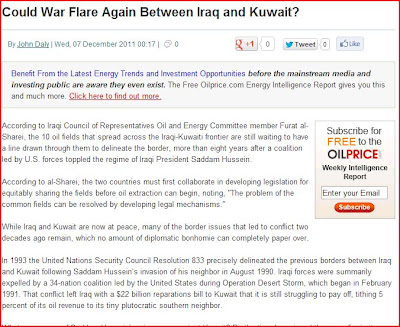More regarding the article: http://oilprice.com/Geopolitics/Middle-East/Could-War-Flare-Again-Between-Iraq-And-Kuwait.html
Summary of Article:
During
the Iran-Iraq war which ended in 1988, Iraq Iraq Kuwait Iraq Iraq
also felt that the action of Kuwait
and the UAE was equivalent to waging an economic war on Iraq Iraq saw Kuwait ’s
refusal to stop overproduction of oil as an attack on its interest and hence Iraq decided to launch an attack on Kuwait Warbah Islands
also contributed to the conflict, which raised tensions between the two nations
and eventually caused Iraq
to invade Kuwait and escalate
a large-scale war which involved other countries such as Saudi Arabia and the USA
Personal Commentary:
I
feel that it is indeed impossible for one party to willingly submit to the
demands of the other party to solve the complications between them. This is
where diplomacy should come in so as to resolve the conflict in a peaceful and
non-violent manner. In my opinion, war and violence is not the solution to the
conflict and that there are many alternatives in solving the problem.
Through diplomacy, each party can make agreements with each other and also create friendly ties to prevent the occurrence of a war. In this conflict, the measure implemented to resolve the problem was the mediation by the Arab League where it requested for
I feel that
This links to the topic in which deterrence and diplomacy are alternatives to resolve complications with two parties in a peaceful manner and therefore, there will be no casualties. We can learn from this issue and prevent the loss of lives in the future.



No comments:
Post a Comment